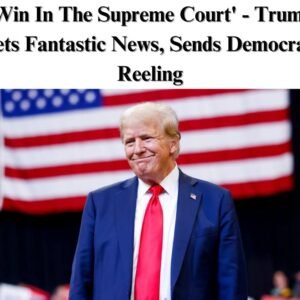In a recent legal analysis that has garnered significant attention, CNN’s senior legal analyst Elie Honig has voiced strong criticism of a federal district court judge for what he deemed “inappropriate” and politically charged remarks regarding President Donald Trump. These comments emerged during a ruling that reversed Trump’s attempt to dismiss the chair of the National Labor Relations Board (NLRB), sparking a heated debate about judicial conduct, executive authority, and the potential politicization of legal decisions.
The case revolves around President Trump’s controversial decision to fire the NLRB chair, an independent agency responsible for safeguarding the rights of American workers. The dismissal was communicated through a brief email shortly after Trump returned to the White House in January, leading to immediate backlash and legal challenges. Hampton Dellinger, who had been serving as special counsel for whistleblower cases, filed a lawsuit to contest his termination. While the case primarily concerns Dellinger’s removal, it also highlights a broader strategy by the Trump administration to remove government officials perceived as politically inconvenient.
Judge Amy Berman Jackson, appointed by former President Barack Obama, issued a ruling that temporarily reinstated Dellinger while the case was under review. In her decision, she made several pointed remarks about presidential authority, notably stating that “an American president is not a king” and that the power to remove federal officers is not absolute. These comments were interpreted by some as a direct critique of Trump’s actions, prompting Honig to argue that the judge’s political language undermined her credibility and strayed from the legal analysis required in such cases.
The legal proceedings did not conclude with Judge Berman Jackson’s ruling. The matter quickly escalated to a three-judge panel of the Washington, D.C. Court of Appeals, which unanimously overturned her decision, allowing Trump to proceed with the firing while the legal issues were still being examined. The appeals court’s ruling indicated that the Trump administration could continue its executive actions as the case moved through higher courts.
During a segment on CNN, host Kaitlin Collins introduced the discussion by summarizing the judge’s ruling and highlighting her controversial remarks. Honig’s analysis became a focal point of the conversation, as he dissected the implications of the judge’s comments. He maintained that while judicial scrutiny of presidential power is essential, the use of politically charged language detracts from the legal reasoning and risks undermining the judiciary’s perceived impartiality.
Honig’s critique emphasized that the judge’s characterization of Trump as a king or dictator was an overreach. He argued that Trump’s legal position, which asserts the President’s inherent authority to remove federal officers, is a reasonable argument within the ongoing debate over executive power. He cautioned that the judge’s remarks, while perhaps intended to underscore limitations on presidential authority, could ultimately erode public trust in the judiciary.
The broader implications of this case extend beyond the immediate legal dispute. It raises fundamental questions about the balance of power between the executive and legislative branches, the role of independent agencies, and the need for judicial impartiality in politically charged cases. As the legal battle continues, the outcome will likely influence future interpretations of executive authority and the mechanisms by which government accountability is maintained.
In conclusion, the controversy surrounding the judge’s remarks and the subsequent legal proceedings reflects a critical moment in the ongoing discourse about executive power in the United States. The case serves as a reminder of the delicate balance between a strong executive and the necessary checks and balances that uphold democratic governance. As the legal landscape evolves, the principles of fairness, impartiality, and the rule of law must remain central to the discourse surrounding the limits of presidential authority.
